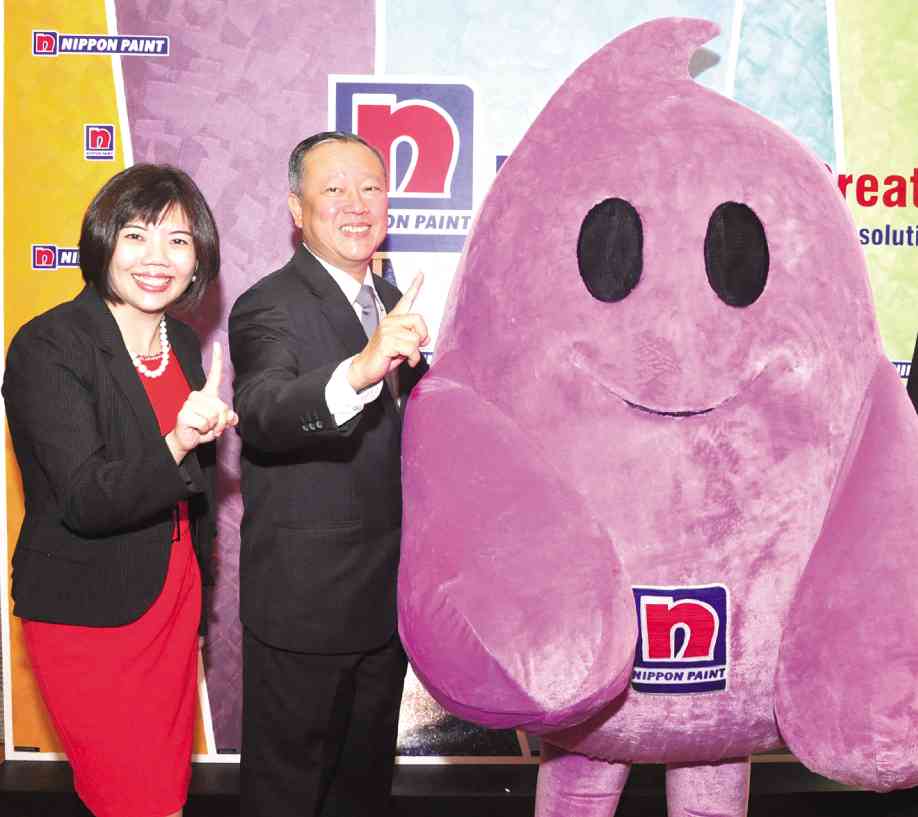Painting a different brand image

GLADYS Goh (left) with Nippon Paint Group Malaysia managing director Yaw Seng Heng and the brand’s mascot
If a new paint color can transform a room, then perhaps a different marketing strategy can change the market’s perception about a brand.
At least that is the hope of Nippon Paint, which has a tradition that dates back to 1881 in Japan. With revenues of $4.88 billion in 2014, Nippon Paint is the leading paint brand in Asia with one of its largest manufacturing plants operating in Malaysia.
But despite its market dominance in the region, the brand is unfamiliar in the Philippines.
“Nippon Paint has always been known for automotive paint. It has been on a B2B (business-to-business) marketing. We supply directly to the car maker. There is no consumer in the picture. Our main customer is the car. Therefore, everyone drives a car without knowing the paint on the car body,” says Gladys Goh, Nippon Paint’s group general manager, “it’s functional and industrial. We have been missing out on the architectural market, the paint for home.”
Goh cites recent research showing that the Philippine market for paint was worth $745 million in 2013. The country’s consumption is modest at 3.1 kilograms per capita—compared with the world average of 6.1 kg per capita.
“There is an opportunity to expand the paint market in the Philippines because the consumption is still low. This is where Nippon Paint can complement the existing strong paint players as our offerings are differentiated from them,” she says.
Last year, Nippon Paint was launched in the Philippines as a premium brand for architectural and decorative paint. It not only provides a wide range of colors and special effects but also protection from the weather, fungus and bacteria.
Nippon Paint pioneered in odorless paint that cleans the air by absorbing formaldehyde and converting it to water vapor. Other brands followed by developing their own eco-friendly variant.
“We wanted to change the perception of paint, from a mere functional product into a daily life complement,” says Goh. “Home is the most expensive investment. People take pride in their house. Paint is the most cost-effective way to change the mood of the house.”
Nippon Paint’s approach is to use the transformative power of color.
“Trend Beyond Color” is a marketing strategy targeted to home owners, architects, designers and developers. It aims to show the brand’s extensive color range, dramatic paint effects and do-it-yourself applications.
As in fashion forecasts, Nippon Paint also predicts the colors of the season.
“The paint market can provide quality paint for a white wall. The color doesn’t peel and it will last forever, so there is no need for repainting. However, the business transaction will happen only every 10 years. If Nippon Paint says blue is the trend and next season it’s red, I can now sell a can every two years,” says Goh.
The campaign is complemented by the Nippon Colour Creations Machine, an automated color tinting machine that can dispense a wide variety of colors.
A year after the local launch, the machine is now found in some 100 paint and trading stores in the Philippines.
To make consumers feel more confident about their choices, the company launched an app which enables customers to have an idea of how different color schemes will look in their home.
It also allows the user to determine the amount of paint needed to execute their design as well as the corresponding cost.
Then again, architects, interior designers and developers have been loyal to other paint brands that have been in the market longer.
Thus aside from product launches, Nippon Paint participated in major events such as the United Architects of the Philippines’ (UAP) National Convention to drum up support.
“We don’t have big money for advertising. We can’t compete with the established brands like Davis and Boysen. The convention was our chance to talk to 2,000 architects. For a newcomer, we need a platform to tell them who we are and what we can bring to the Philippines,” says Goh.
To further increase its visibility, the company has organized the Nippon Paint Young Designers Award (NPYDA), an annual competition for architecture and interior design students from schools associated with the UAP and the Philippine Institute of Interior Designers. NYPDA began in 2008 in Malaysia with 50 entries. Last year, over 2,000 entries showed the growing level of interest and awareness of the Nippon brand.
This year’s theme, “Design with Heart: For a Sustainable Future with People in Mind,” challenges participants to integrate the heart as a design element or cultural symbol.
Interior design students are tasked to create a workspace that promotes work-life balance while architecture students must design an interactive community venue.
These designs must not only be creative, practical and comfortable but also sensitive to the needs of pregnant women, elderly, and physically disabled. The proposed color scheme must come from Nippon Paint’s product line with the matching color name, code and product range. The entries will be judged according to the adherence to green design, innovation and color concepts. The campaign ends on Sept. 30.
“By speaking to younger minds, [we also get to speak to] students who will eventually become the influencers of home owners,” says Goh.

